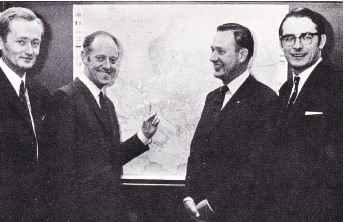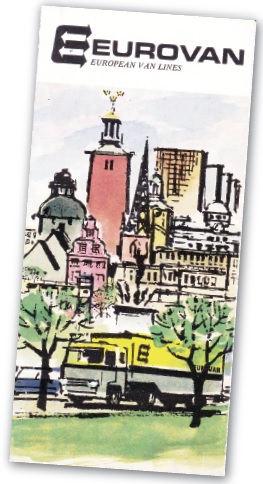Michael Scott has been a major figure in the international moving industry for most of the last 50 years. As well as running a successful moving company, he was chairman of the BAR Overseas Group, president of BAR, a founder of Eurovan and director of FIDI. Steve Jordan met him at his home in Surrey for a chat.
It was in 1876 when Queen Victoria was on the UK throne and Benjamin Disraeli was her Prime Minister that Herbert Scott and Charles Pitt put their heads together to form the moving company that was to bear their names for over 100 years. The plan, was to provide a service to American tourists, engaged in the European Grand Tour, to ship their treasured purchases home. It was a trade that Pitt & Scott embraced for much of its life.
Herbert was Michael’s great uncle. “He was a dynamo,” he said. “By 1883, just seven years after the company was formed, Pitt & Scott handled all the exhibits for the World Fair in Chicago, had branches in Liverpool, Glasgow, Paris, Hamburg and four fully owned branches in the USA.”
It seems that the whole family were blessed with energy and business acumen. In 1895 the US companies had been found guilty of cheating customs so Michael’s grandfather headed off, at the tender age of 27, to successfully recover the situation and drive the success of the US operations until his return in 1908. Michael’s father, Douglas, took over the company in 1947 and by the 1960s it was employing over 200 people.
The moving industry was always important to Pitt & Scott but it had many more irons in the fire. It provided insurance for travellers’ belongings at railway stations though a separate organisation, the Travellers’ Insurance Association (TIA), an organisation that was sold in the 1920s to keep the company solvent during the general strike and the depression.
Another diversification was the Ocean Travellers’ Club, started in the 1950s to sell holidays on cargo ships. “It was a great way to have a holiday,” said Michael. “In those days, when a ship was in port it was there for a few days. Plenty of time for sightseeing.” It was a business that flourished until the rise of containerisation put a stop to it.
Michael joined the company after studying mathematics and law at Magdalene College Cambridge. “I didn’t feel that it was an obligation more that it was the right thing for me to do,” said Michael. “I enjoyed it a lot and felt I was quite good at it at the time.”
In 1968 Michael, with three industry colleagues - Cari Spillman, Welti Furrer, Zurich;  Lars Osman, Kungsholms, Stockholm;and Juergen Schmit Klingenberg, Klingenberg, Hamburg – started Eurovan. “Allied Van Lines had decided to expand into Europe,” Michael explained. “They were beginning to recruit companies and we didn’t want to lose the cooperation of our agents.” The plan was to operate Eurovan as a return load bureau helping to reduce costs for members. It was very successful. The Allied organisation morphed into CETI and, in the mid 1980s, Eurovan and CETI joined forces to create OMNI which is still a powerful force in the industry today.
Lars Osman, Kungsholms, Stockholm;and Juergen Schmit Klingenberg, Klingenberg, Hamburg – started Eurovan. “Allied Van Lines had decided to expand into Europe,” Michael explained. “They were beginning to recruit companies and we didn’t want to lose the cooperation of our agents.” The plan was to operate Eurovan as a return load bureau helping to reduce costs for members. It was very successful. The Allied organisation morphed into CETI and, in the mid 1980s, Eurovan and CETI joined forces to create OMNI which is still a powerful force in the industry today.
He took over as managing director of the company in 1971 after his father’s death. He was still a young man but he had his father’s trusted team around him. “People such as John Millard, Jack Ellis and Douglas Crowhurst were very loyal to the company and we got on well,” said Michael.
 It was Jack Ellis who first introduced Michael to the BAR Overseas Group. Jack had been FIDI’s first president in 1951. Michael started as an Overseas Group Councillor in 1965 and was able to use his wide knowledge of the industry to help guide the organisation. He became one of its representatives to FIDI (with Michael Gerson) and the Overseas Group’s chairman in the 1970s.
It was Jack Ellis who first introduced Michael to the BAR Overseas Group. Jack had been FIDI’s first president in 1951. Michael started as an Overseas Group Councillor in 1965 and was able to use his wide knowledge of the industry to help guide the organisation. He became one of its representatives to FIDI (with Michael Gerson) and the Overseas Group’s chairman in the 1970s.
Michael was Overseas Group chairman in 1976 when two international moving companies, QRS and Seven Seas, went out of business leaving private customers out of pocket. It was during Michael’s chairmanship that BAR set up the IMMI advance payment scheme to provide protection for customers. This system remains in place today.
But the experience had left Michael somewhat disillusioned with the industry. “The whole shape of the industry was changing. Prices were cut-throat and companies were easy to start and very difficult to close down as soon as they start to expand. You have to be a very clever person to build a company and make it top notch. Some achieved it: Bryan Bennet with Movers International in Canada, Paul Evans with Trans Euro in London, Michael Gerson did very well, Bill Reinch with Transpo in Thailand. But there were many examples of companies that didn’t thrive either because the owners were not sufficiently ruthless or clever enough.”
At that time the general business was under threat from the big operators and fine art packing died because Americans stopped coming. Michael decided not to encourage his sons into the business, but to sell it in 1985 to Pickfords.
“I really regretted that afterwards because Pickfords had different values and we lost our antique and fine art packing business quite quickly. They gave much more importance to the storage and particularly office records storage. Our international moving business died fairy shortly afterwards because Pickfords didn’t give importance to personal service in the way we had done.”
He stayed on for a while but was never comfortable with the new set up. In 1988 he accepted an offer from FIDI to join as its director. “FIDI was changing at that time,” said Michael. “It was looking for more training and a payments guarantee system between members.” He got them both started. The training seminars were very popular and well attended and Michael’s experience with BAR had made him amply qualified to set up what became the Payment Protection Plan (PPP).
Somehow Michael managed to convince tutors to give their time freely for the benefit of others. “They only got paid expenses but their companies valued them being seen as experts in their field. They enjoyed, it, they saw it was worthwhile. I certainly did.” The general management course took students through every part of moving and included field visits and a two-hour examination at the end. “Not everyone passed. We always had a few failures which increased the tension and the kudos for success.”
Michael stayed at FIDI for ten years. When he retired aged 60 he continued to manage the training programme for a further seven years. But the shift to an increasing reliance on online learning didn’t sit well with Michael. He admits to being a little old fashioned but believes that people learn best face-to-face. He said that he always tried to have a good mix of students with people from as many companies and countries as possible. “I thought it was wrong because managers need to manage people, I didn’t think looking at a computer screen would be better.” He acknowledges, however, that online learning does make education more accessible to a much wider audience.
Asked what were his successes and failures, Michael said that he thought the PPP was a success. “It had a slow payers list that included every reported bill over three months old. If a company showed danger signs the correspondence started. We had to pull the plug on a few companies.”
Surprisingly, perhaps, Michael sees the creation of OMNI as a failure. “I rather regretted that OMNI was a sort of club within a club,” he said. “It was a pity that FIDI lost some of its importance because OMNI was the big companies with the big traffic. It wasn’t quite the same if the OMNI conference was seen as being bigger or better. I felt that it was taking something away from the FIDI conference and making FIDI appear second class.” Michael acknowledges the irony that he was one of the founders of Eurovan, OMNI’s forerunner.
“The relationship between OMNI and FIDI was beginning to get a little less good around the turn of the century. The bigger and better companies were seeking out the other bigger and better companies and [OMNI] was a way of having a closer contact with them. I think it was a natural thing to happen.”
Today, Michael has little contact with the industry that fed his family for four generations. He stays in contact with a handful of close friends, still plays a little golf and partners his wife, Jill, at bridge. Bridge is my main time occupier now,” he admits. But they are both still healthy enough to enjoy travelling, including trips to the USA twice a year to see their sons and wider family.
Michael Scott inherited a successful company but chose to let it go as the industry changed around him. His contribution to the wide industry, however, was profound and will be felt for many years to come.
Photos: Middle right: The Eurovan managers, (left to right) Juergen Schmit Klingenberg of Klingenberg; Cari Spillman of Welti Furrer; Lars Osman of Kungsholms and Michael Scott. middle left: Eurovan promotional literature of the time.
Click here to see the next Editor's Pick